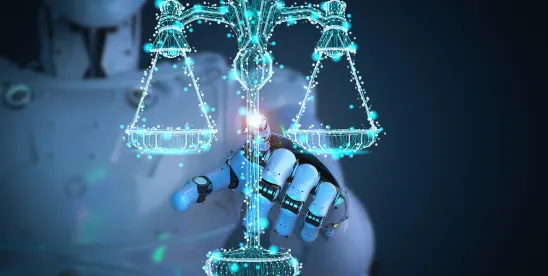Highlights
- The Supreme Court of Delaware has enacted an interim policy that governs what generative artificial intelligence platforms can be used, and how, by court personnel
- The Supreme Court of Georgia created an Ad Hoc Committee to begin investigating the potential benefits and risks of AI in the administration of justice
- With new regulation of and guidance for the use of AI, those who interact with the legal system should keep apprised of new AI requirements and developments
Court systems and the greater legal community are grappling with how best to address the benefits and potential risks associated with the proliferation of generative artificial intelligence technology (GenAI). The Supreme Courts of Delaware and Georgia both issued orders on Oct. 22, 2024, concerning their efforts on this front.
Delaware adopted an interim policy on GenAI usage by court personnel and Georgia established an Ad Hoc Committee to recommend best practices and possible uses of AI in the administration of justice.
Delaware
The Delaware Commission on Law and Technology (DCLT), whose mission includes the responsibility “to assess developing technology and to identify critical needs and gaps,” drafted and recommended an interim policy regarding the use of GenAI by “judicial officers, employees, law clerks, interns, externs, and volunteers” within Delaware’s judicial branch.
The Delaware Supreme Court has now adopted that interim policy “to ensure the safe and appropriate use of GenAI by judicial officers and court personnel, but not to be used as a substitute for judicial, legal, or professional expertise” or as a substitute for human “decision-making function[s].”
Under the interim policy, court personnel using GenAI “are responsible to ensure the accuracy of all work product and must use caution when relying on the output of GenAI.” To help mitigate against potential risks of GenAI, court personnel are permitted to use only certain approved GenAI platforms, must receive training on the capabilities and limitations of GenAI, and are prohibited from inputting nonpublic information into unapproved platforms.
The DCLT is to monitor how the interim policy is implemented and report any proposed changes that may come to light as GenAI usage expands in the Delaware courts.
Georgia
The Supreme Court of Georgia has announced a final list of 16 members of the Ad Hoc Committee on Artificial Intelligence and the Courts, which held its first meeting on Oct. 23, 2024. The committee was formed by an order from the Judicial Council of Georgia on August 13, 2024 to “assess the risks and benefits of the use of Generative Artificial Intelligence on the courts and to make recommendations to ensure that the use of AI does not erode public trust and confidence in the judicial system.”
The order forming the Ad Hoc Committee stated that it should be composed of members from all facets of the judicial system including judges from different levels of the courts, a prosecutor, a public defender, a district court administrator, and a representative from the State Bar of Georgia AI Committee.
The Ad Hoc Committee is tasked with making “recommendations regarding possible uses of AI that could be beneficial to the administration of justice and access to justice.” To achieve this goal, the committee is to consider 10 key points of focus along with any other points it deems appropriate. The points of focus include:
- National and international best practices
- The potential effect on trial evidence – authentication, deepfakes, and the ability to enhance audio or video recordings
- The adequacy of current court rules and ethical standards in addressing the use of AI
- The impact of bias, confidentiality, and security issues in the use of AI
- The need for education on the benefits and risks of AI
Authorization for the Ad Hoc Committee is set to expire on June 30, 2025, but can be extended through further order of the Judicial Council of Georgia.
Takeaways
Discussions of the use of GenAI is proliferating in the law, both by court personnel and attorneys. Courts throughout the country are taking action to determine or prescribe rules concerning acceptable uses of GenAI in litigation and by judicial personnel. Those who are a part of, or interact with, the legal community should keep apprised of developments in the court rules to ensure compliance with court requirements.






 />i
/>i

